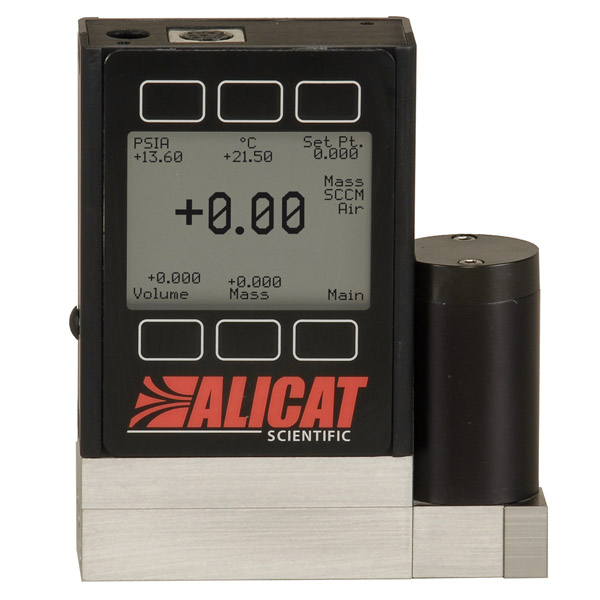TCP/Serial driver and command line tool for Alicat mass flow controllers.
If you are using Analyt-MTC flow controllers, go to this repository for more info.
| Type | Usage |
|---|---|
The standard DB9 cable connected directly to a computer (unix: /dev/ttyS0, windows: COM1). |
Good with older computers that still have the connector. |
The cable connected to a computer through a USB converter (unix: /dev/ttyUSB0, windows: COM1). |
Good for newer computers and maker boards such as Raspberry Pis. |
Multiple cables connected to one port via a splitter and Alicat's addressing (A-Z). |
Good when number of ports is limited. |
Cables routed through a TCP device server (192.168.1.100:23). |
pip install alicat
For basic tasks, this driver includes a command-line interface. Read the help for more.
alicat --help
This uses Python ≥3.5's async/await syntax to asynchronously communicate with an Alicat. For example:
import asyncio
from alicat import FlowController
async def get():
async with FlowController('ip-address:port') as flow_controller:
print(await flow_controller.get())
asyncio.run(get())If the flow controller is communicating on the specified port, this should return a dictionary of the form:
{
'setpoint': 0.0, # Setpoint, either mass flow rate or pressure
'control_point': 'flow', # Either 'flow' or 'pressure'
'gas': 'Air', # Can be any option in `flow_controller.gases`
'mass_flow': 0.0, # Mass flow (in units specified at time of purchase)
'pressure': 25.46, # Pressure (normally in psia)
'temperature': 23.62, # Temperature (normally in C)
'total_flow': 0.0, # Optional. If totalizer function purchased, will be included
'volumetric_flow': 0.0 # Volumetric flow (in units specified at time of purchase)
}On flow controllers, you can set the flow or pressure setpoints.
await flow_controller.set_flow_rate(1.0)
await flow_controller.set_pressure(20)You can set the gas type by name or by index. For more on setting by index, see the gas table in your Alicat's manual.
await flow_controller.set_gas('N2')
await flow_controller.set_gas(8)For firmware 5v and greater, you can create and set gas mixes. Mixes can contain up to five gases and are stored in gas indices 236-255.
await flow_controller.create_mix(mix_no=236, name="Mix1", gases={'N2': 50, 'O2': 30, 'CO2': 20})
await flow_controller.set_gas(236)
await flow_controller.delete_mix(236)For flow controllers, read and write PID loop settings for device tuning.
await flow_controller.set_pid(p=4000, i=4000, d=10, loop_type='PD2I')
print(await flow_controller.get_pid())
{
'loop_type': 'PD2I',
'P': '4000',
'I': '4000',
'D': '10',
}Additional features include override commands to increase device functionality.
await flow_controller.lock() # Lock the front display.
await flow_controller.unlock() # Unlock the front display.
await flow_controller.hold() # Hold the valve in its current position.
await flow_controller.cancel_hold() # Cancel the valve hold.
await flow_controller.tare_volumetric() # Tare volumetric flow.
await flow_controller.tare_pressure() # Tare pressure.
await flow_controller.reset_totalizer() # Reset totalizer, if totalizer functionality included.You can have multiple controllers on the same port by using Alicat's A-Z addresses
and an RS-232 splitter.
flow_controller_1 = FlowController(address='A')
flow_controller_2 = FlowController(address='B')
await flow_controller_1.set_flow_rate(1.0)
await flow_controller_2.set_flow_rate(0.5)
await flow_controller_1.close() # /dev/ttyUSB0 is still open!
await flow_controller_2.close()0.5.0
- Support only
asyncio. The last version with synchronous code was0.4.1. - Rename
address/-atounit/-uto match Alicat's documentation - Rename
-uto-ul(for--unlock)
0.4.1
Remove TCP support. Use pip install alicat==0.3.1 if needed




